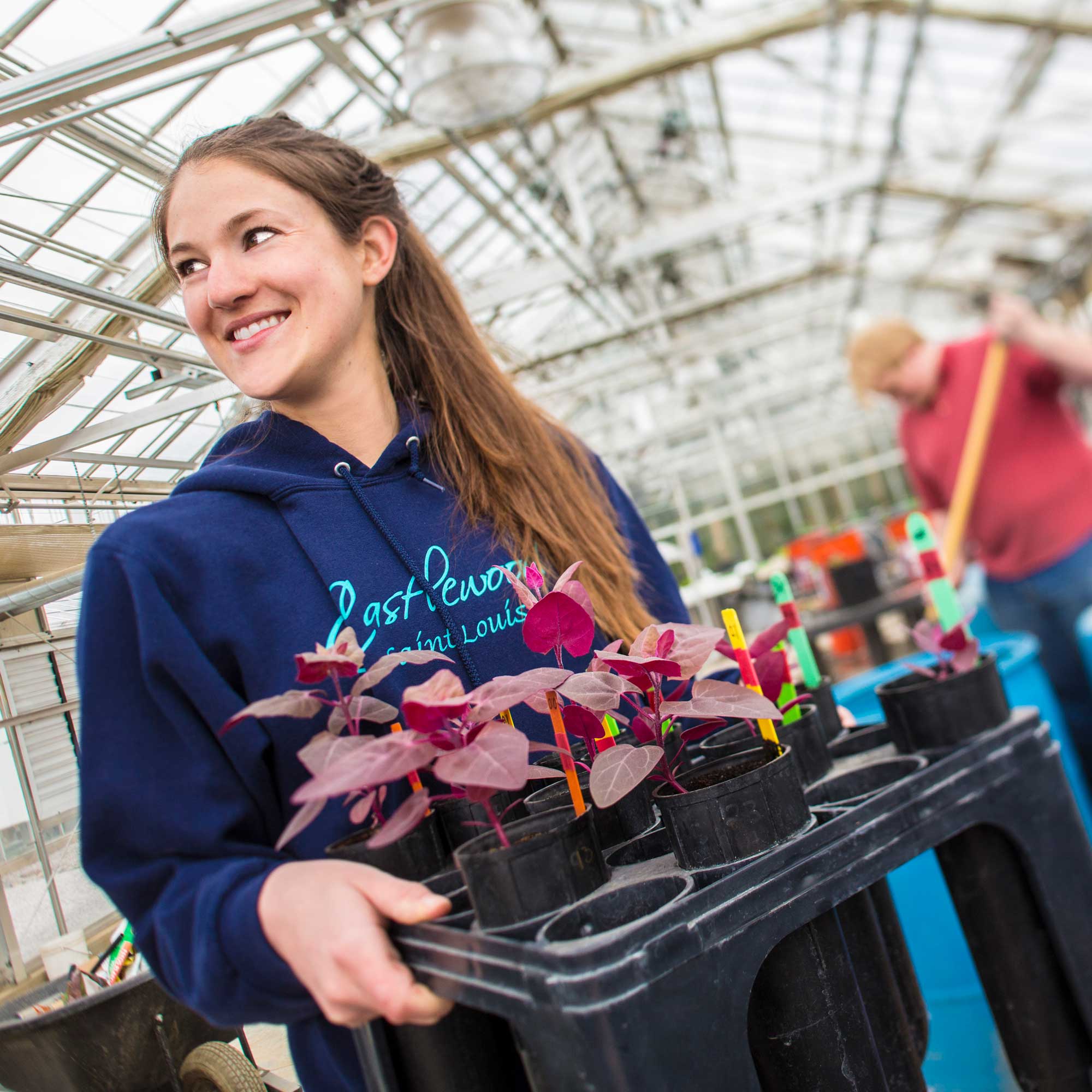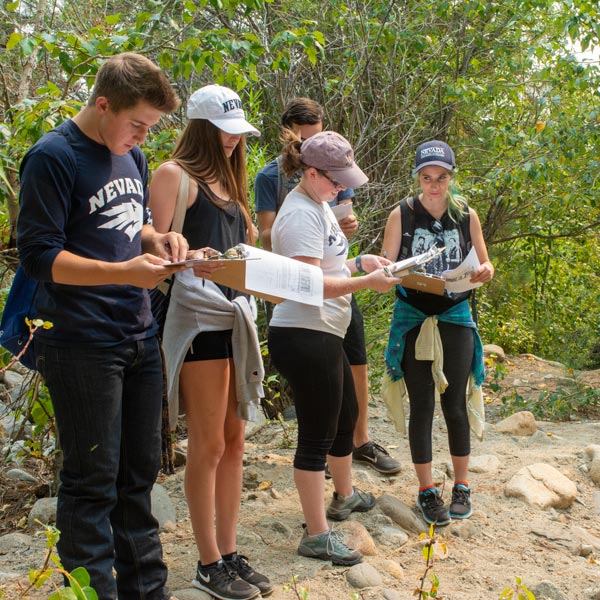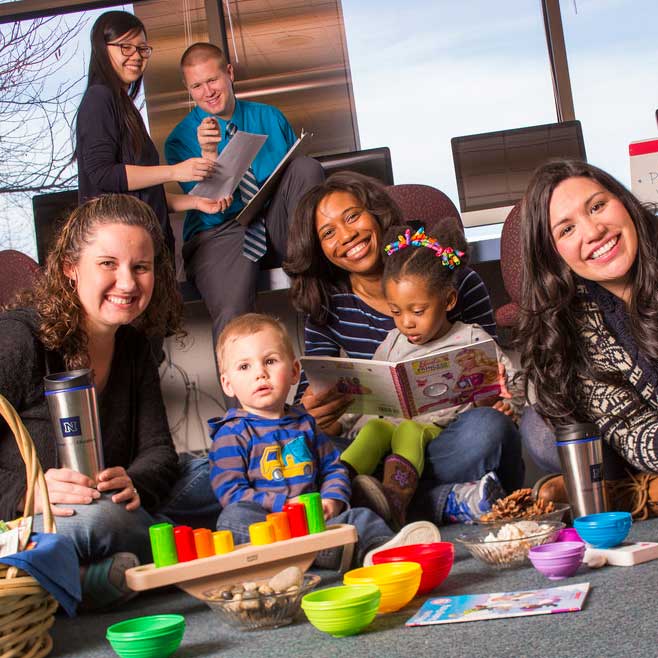In this edition
- Undergraduate research is a highlight of College experience
- College partners with USDA to bolster regional food systems
- Nevada child care programs to be assessed for impacts and efficacy
- Free radon test kits available now from Extension
- College’s Desert Farming Initiative raising funds to upgrade plant nursery
About our College
A founding college of the University, we have a long tradition of excellence in teaching, research and engagement programs that benefit the health and economic vitality of Nevada. We offer programs in:
- agriculture, horticulture, rangeland and veterinary sciences
- biochemistry and molecular biology
- children, youth and families
- community and economic development
- health and nutrition
- natural resources and environmental science
Undergraduate research is a highlight of College experience
Biotechnology major Jaeden Tedsen works on cutting-edge nanodisk research
Jaeden Tedsen
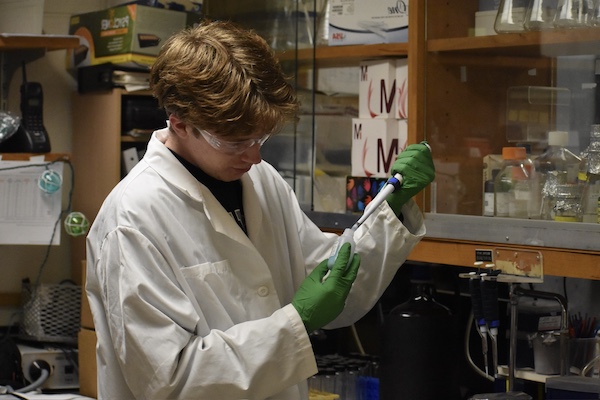
Jaeden Tedsen performs hands-on research in the College’s Harper Lab. He aims to develop a safer, more effective treatment for severe fungal infections using nanodisks.
Nanodisks. It’s a word I’ve seen in science fiction. Nanodisks are microscopic disks, smaller than the width of a human hair. They will hopefully be the next generation of drug delivery and personalized medicine.
I knew going into the College that I would learn about the chemistry and techniques of the biomedical industry. I never thought I would have the opportunity to work with this biotechnology, performing hands-on research that could actually make a difference.
The project I’m working on is with College Professor Jeffery Harper. It’s an off shoot of a project in the College’s Ryan Lab by biochemistry student Kyle Lethcoe. It’s to take the nanodisk he made and make it better.
Some quick background: Treatment of fungal infections is nowhere near as studied or advanced compared to bacterial infections. Because of this lack in development, treatment of severe fungal infections includes the use of a very toxic drug: amphotericin B.
I’m working to target the nanodisks to where the infection is, reducing the dosage of amphotericin B needed and making treatment a whole lot safer. Failure in this is a very real possibility. But even failure is success in research because you’re able to learn from your mistakes. Every time I come to my mentors with another failed result, we sit down, talk about it and hammer out a game plan to address the shortfalls. I’ve learned more in these discussions than I ever did reading a textbook.
Delivering real-world student experiences
“I highly recommend students try participating in research. It’s low pressure and you get real-life experience. It is very rewarding and ultimately a highlight of my College experience.” – Biotechnology major Jaeden Tedsen
College partners with USDA to bolster regional food systems
USDA project allocates $5 million to Nevada to build a stronger agricultural infrastructure
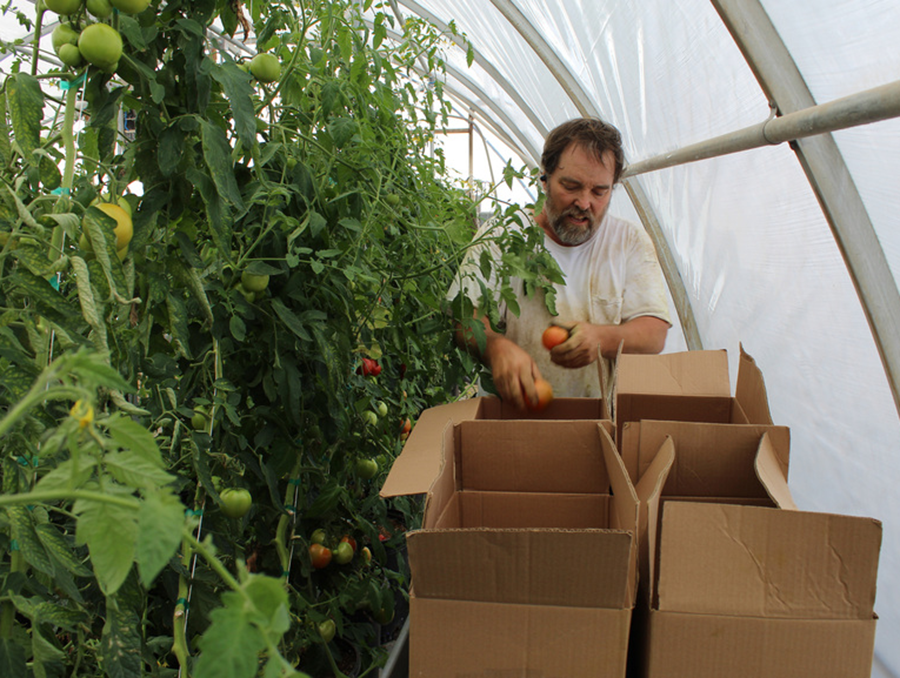
Rodney Mehring, owner of Blue Lizard Farms in Caliente, Nevada, harvests 600 pounds of tomatoes from one of the farm’s hoop houses, some of which was delivered to Three Square Food Bank in Las Vegas. Photo by Abraham Mehring.
The College has entered a partnership with a consortium of public institutions, in collaboration with the U.S. Department of Agriculture (USDA), bringing $5 million to Nevada to strengthen the agricultural food supply system. The partnership is part of a $30 million overarching project by the USDA’s Southwest Regional Food Business Center.
The overarching project is coordinated across Nevada, California, Utah and Arizona by the University of California, Davis. It is timely for Nevada, as it addresses the issues of growing food insecurity and excessive dependence on imported food.
The College’s Extension unit will lead the project in the state, providing small-scale farmers, processors and distributors training and guidance to expand markets and improve access to government services and funds. Extension will draw on its extensive grassroot networks developed over a century of providing agricultural programs, the College’s Experiment Station unit, and the Nevada Department of Agriculture, a key partner.
Extension Educator Staci Emm, the project’s state implementation manager, said, “This comprehensive approach marks the first long-term program in Nevada specifically designed to enhance the distribution and processing of agricultural products, setting many of our producers up for success.”
As part of the overarching project, the Southwest Regional Food Business Center will also have a leadership council. The council will offer policy recommendations, coordinate funding opportunities and oversee business builder grants.
Nevada farmer Rodney Mehring said, “I believe the regional food centers have the potential to empower farmers of all scales, to compete effectively against larger producers.”
Partnering on important work
“This grant is another step in the right direction by providing additional resources for producers and consumers, and we are thankful to partner with Extension on important work like this.” - Nevada Department of Agriculture Director J.J. Goicoechea
Nevada child care programs to be assessed for impacts and efficacy
Extension awarded $2.4 million grant to conduct evaluation

Extension’s evaluation on child care programs will include site visits, among other strategies, to assess impacts for Nevada families and providers.
Child care programs and projects in Nevada that collectively received $231 million from the Coronavirus Response and Relief Supplemental Appropriations Act and a supplement to the American Rescue Plan Act are now undergoing an evaluation by Extension to help the state determine future priorities and funding. Extension has been awarded $2.4 million by the Nevada Department of Health and Human Services Division of Welfare and Supportive Services to help the state assess the programs and projects.
“As the sunset date for pandemic-related child care funds approaches, the state intends to use clear evaluation results to understand which programs and projects have most effectively made a positive impact on Nevada’s early childhood care and education system,” said Karissa Loper Machado, an agency manager for the division. “The state will use the evaluation results provided by Extension to inform future planning and program sustainability efforts.”
Extension will evaluate more than 40 projects statewide, looking at the effectiveness, efficiency, relevance, sustainability and impact of each.
“Extension values its ability to serve as a resource for state agencies in addition to providing programming,” Extension Director Jake DeDecker said. “We’ve been focusing on expanding our partnerships with state agencies, the counties and others to provide evaluation, feasibility studies, economic impact research and more.”
Benefitting Nevada families
“Our role is not just to deliver programs to the communities, but also to assure that programs are functioning well and benefiting the citizens of Nevada. This grant will contribute to the continuation of projects and programs that have a real impact on child care providers and families in Nevada.” - Extension Specialist Najat Elgeberi
Free radon test kits available now from Extension
High levels of radon have been found to cause lung cancer – reduce your risk
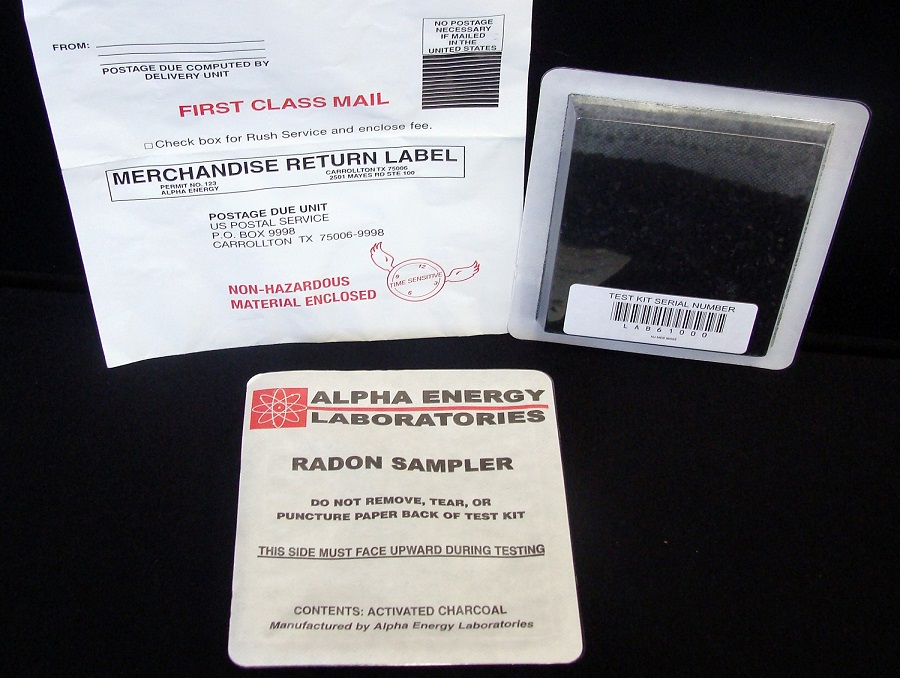
Free radon test kits are available in the state through Feb. 29, while supplies last.
January is National Radon Action Month, and Extension’s Radon Education Program is offering free short-term radon test kits to Nevadans through Feb. 29, while supplies last. Radon is a naturally occurring, radioactive gas that is colorless, odorless and tasteless. It comes from the ground and can accumulate in homes and buildings, raising the risk of lung cancer.
“Lung cancer claims more lives each year than any other form of cancer, astonishingly impacting more women than breast cancer and posing a higher risk to Nevadans compared to the national average,” said Chris Kelly, Radon Education Program manager.
This is preventable. Testing for radon using the free kit is simple. It takes just three days, with results ready in a few weeks. Homes with elevated levels can be brought down to safety levels.
To address the issue of radon testing during real estate transactions, Extension’s Radon Education Program also provides free continuing education classes for realtors.
Protecting all Nevadans
“One in four homes tested in Nevada has elevated radon levels. Addressing this issue comprehensively through enhanced education and testing is critical to protecting all Nevadans, ensuring safety and well-being.” – Program Manager Chris Kelly
College’s Desert Farming Initiative raising funds to upgrade plant nursery
Pauses program to provide organic plant starts to local growers until facility needs can be met
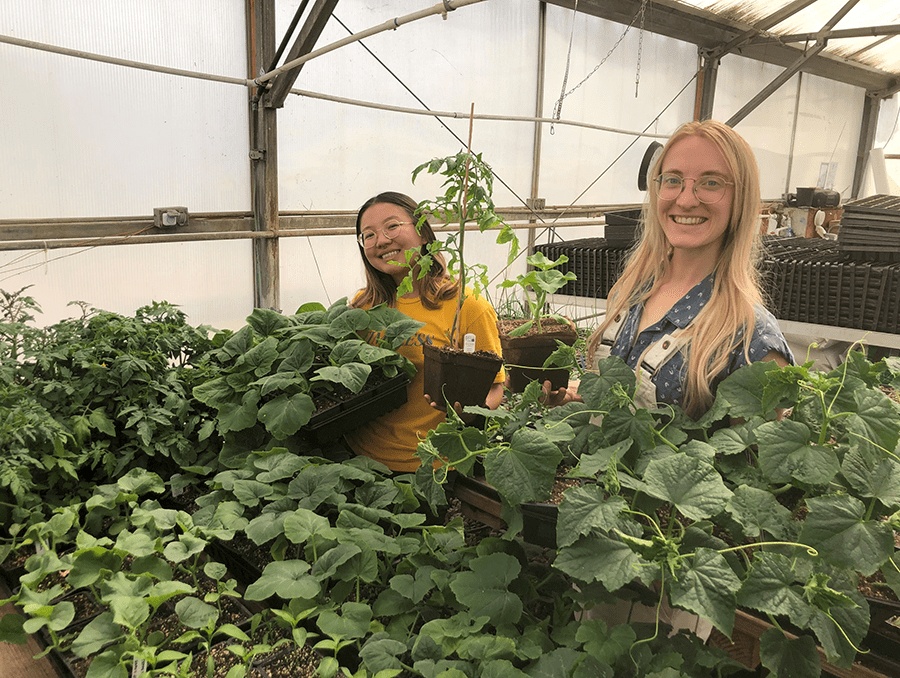
Trishtin Lieu, AmeriCorps service member (left) and Anna Miller, Food Systems Program manager, tend to plants in the Desert Farming Initiative’s nursery. Photo by Jill Moe.
The College’s Desert Farming Initiative has had to take a pause in providing more than a dozen local growers with organic plant starts for their farms and agricultural programs, due to aging equipment and greenhouse facilities. In order to be ready to help producers with organic plant starts for next spring, the Initiative has embarked on a crowdfunding campaign to raise $10,000 by this May.
“We know that local producers value being able to get these organic plant starts locally, and from a trusted source,” said Jill Moe, director of the Initiative, which is part of the College’s Experiment Station unit. “Ultimately, the plant starts wind up serving consumers here in northern Nevada.”
The greenhouse is the only certified organic wholesale nursery in Nevada. Moe said they usually grow about 100,000 plant starts each year, for the Initiative’s farm, local producers, educational programs, tribal hoop houses, Master Gardeners and local sales.
Providing value in community
“We’re asking for community support. Having a nursery like ours is cool because it can provide climate-adapted plants for our area and reduce the need for imports. That’s valuable to local growers and all of us who choose locally grown, organic produce for our tables.” – Director Jill Moe
Innovating for Nevada
Our programs work together to make an impact
Our teaching, research and engagement programs are intertwined and complement one another. Faculty who teach on campus also conduct research as part of our Experiment Station, allowing students to learn about and participate in research. Extension faculty engaging with communities identify research needs, as well as join Experiment Station faculty to conduct research. Faculty on campus help to develop Extension programs in communities.
